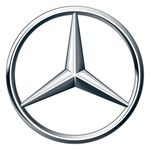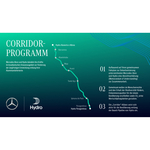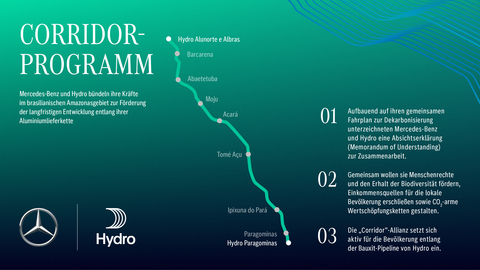 BUSINESS WIRE
BUSINESS WIRE


- Corridor Program: Mercedes-Benz and Hydro extend their strategic partnership to support the long-term development of communities along the aluminum supply chain in the state of Pará, Brazil.
- Just Transition: Lighthouse project to create positive impacts for both people and nature throughout aluminum supply chain in Brazil.
- Joint efforts: Mercedes-Benz, Hydro and local NGOs form a steering committee to enhance community involvement in mining area.
- Decarbonization: In 2022, Hydro and Mercedes-Benz agreed to work together on a technology roadmap for producing low-carbon aluminum.
Mercedes-Benz and Hydro Join Forces in the Brazilian Amazon to Foster Long-Term Development Along Their Alumin
um Supply Chain
Benjamin Kraft, +49 176 3095 7277, benjamin.b.kraft@mercedes-benz.com
Pia Droldner, +49 176 30988043, pia.droldner@mercedes-benz.com
Andrea Berg, +1 917 667 2391, andrea.a.berg@mercedes-benz.com
At the New York Climate Week, Mercedes-Benz and Hydro elevate their strategic partnership by enhancing the vertical integration of their aluminum supply chain and launching the long-term Corridor Program for a sustained development in the Amazon. Following their joint decarbonization roadmap Mercedes-Benz and Hydro signed a Memorandum of Understanding (MoU) to collaborate with local NGOs and partners in the state of Pará, Brazil. Their goals include promoting human rights, generating income for local communities, fostering biodiversity and low-carbon value chains in the Brazilian Amazon.
This press release features multimedia. View the full release here: https://www.businesswire.com/news/home/20240924721980/en/

Mercedes-Benz and Hydro join forces in the Brazilian Amazon to foster long-term development along their aluminum supply chain (Graphic: Business Wire)
“In managing our supply chains responsibly, we concentrate on three goals: The decarbonization of our products, the promotion of human rights and the focus on more sustainability over the vehicles' entire life cycle. The joint Corridor Program manages to connect all three. In close cooperation with our partners, it has the potential to push the vertical integration of our supply chain to a new level.”
Dr. Gunnar Güthenke, Head of Procurement and Supplier Quality Mercedes-Benz Cars
The Corridor coalition aims to create a positive impact for the communities along the 244-kilometer bauxite slurry pipeline operated by Hydro, which runs through seven municipalities in the state of Pará, Brazil – from the Paragominas bauxite mine to the Alunorte alumina refinery in Barcarena. The goal is to engage local communities along the aluminum supply chain and empower them to improve their economic, ecological, and social well-being. Mercedes-Benz is part of the program's governance, helping to establish necessary structures and build knowledge for sustainable risk management in raw material supply chains.
The Corridor initiative reflects the company’s commitment to a "Just Transition": Prioritizing people and human rights along with responsible policies and community engagement as the decarbonization of the Mercedes-Benz Group’s business model leads to significant changes in technology, products, and workforce. The program has the potential to become a blueprint for the involvement of local communities and getting vertically engaged in vulnerable mining areas.
“The joint program with Hydro in Brazil serves as a model: We are sourcing aluminum with reduced CO2-emissions and are firmly committed to uphold human rights along our supply chain. In doing so, we are putting our sustainable business strategy into practice. A special focus is placed on engaging with the local communities. This example demonstrates that decarbonization measures and social considerations can go hand in hand for a successful sustainable transformation.”
Renata Jungo Brüngger, Member of the Board of Management of Mercedes-Benz Group AG. Integrity, Governance & Sustainability
“We are excited to further develop our strategic partnership with Mercedes-Benz, expanding our collaboration beyond low-carbon product development to create positive social and environmental impact in the Amazon. Working together, we aim to lift sustainability throughout our shared value chain, from mine to end-consumer product, while fostering economic opportunities and biodiversity conservation in the communities where we operate.”
Eivind Kallevik, President and CEO in Hydro
The program has been rethought from the ground up and is built on a fundraising concept. While some projects, like scaling up local farming (Tipitix) or sewing initiatives (Estilo), are already underway, the Corridor coalition aims for long-term value creation. Local communities living around the pipeline will identify and prioritize projects, ensuring they directly benefit their regions. This approach empowers local stakeholders to foster ownership and align with the project's overarching goals. This way Corridor intends to achieve improvements for the local people. Hence, data-based tracking of effectiveness will be a crucial part of the governance.
The program will be anchored on three strategic pillars:
- Economic Development: Identifying obstacles to the economic development and finding solutions to improve the conditions for raw material value chains in the territory.
- Social Development: Large scale approach to social development, targeting basic human needs, well-being, and opportunities. The program will pursue practical ways to implement improvements to the condition of life in the communities, both in urban centers but mainly in rural areas (e. g. ongoing TerPaz program).
- Environment and Biodiversity conservation: Working on the conservation of biodiversity in the Amazon, required to ensure positive gains for people and nature. The program will identify opportunities to reduce degradation of forests as a first target but with an ambition to contribute to the regeneration of nature.
The projects will operate in strict compliance with Brazilian laws and regulations. Moreover, the program will be implemented by a multi-institutional project organization composed by the companies and organizations. Partners include (but not limited to) Hydro Brazil, Alunorte, MPSA, Mercedes-Benz, IPAM*, IMAZON**, CEA***, Hydro Sustainability Fund and BCG.
About Mercedes-Benz
Mercedes-Benz is dedicated to responsible raw material sourcing and advancing global mining standards. Key to this is ensuring low participation barriers for mining communities and indigenous peoples as well as effective certification schemes. The company is actively involved in various raw material initiatives and has extended partnerships with Bon Pasteur in the Democratic Republic of Congo and Terre des Hommes in India to support human rights. Mercedes-Benz aims to merge commercial success with responsible actions towards the environment, people, and society across the entire value chain.
Moreover, Mercedes-Benz will consistently create the preconditions for a net carbon-neutral**** new vehicle fleet by 2039. The company focuses on reducing CO? emissions and preserving resources through its "Design for Environment" approach. Mercedes-Benz collaborates with partners to research sustainable materials and promote circularity.
About Hydro
Hydro is a Norwegian leading aluminum and energy company that builds businesses and partnerships for a more sustainable future. Hydro is committed to leading the way towards a more sustainable future, creating more viable societies by developing natural resources into products and solutions in innovative and efficient ways. Hydro is through its businesses present in a broad range of market segments for aluminum, energy, metal recycling, renewables and batteries, offering a unique wealth of knowledge and competence.
* IPAM Amazonia
** Instituto do Homem e Meio Ambiente da Amazônia
*** Centro de Empreendedorismo da Amazônia
**** Net carbon-neutral means that carbon emissions that are not avoided or reduced at Mercedes-Benz are compensated for by certified offsetting projects.
Further information on Mercedes-Benz Group is available at:
media.mercedes-benz.com and group.mercedes-benz.com
Forward-looking statements
This document contains forward-looking statements that reflect our current views about future events. The words “anticipate”, “assume”, “believe”, “estimate”, “expect”, “intend”, “may”, “can”, “could”, “plan”, “project”, “should” and similar expressions are used to identify forward-looking statements. These statements are subject to many risks and uncertainties, including an adverse development of global economic conditions, in particular a negative change in market conditions in our most important markets; a deterioration of our refinancing possibilities on the credit and financial markets; events of force majeure including natural disasters, pandemics, acts of terrorism, political unrest, armed conflicts, industrial accidents and their effects on our sales, purchasing, production or financial services activities; changes in currency exchange rates, customs and foreign trade provisions; changes in laws, regulations and government policies (or changes in their interpretation), particularly those relating to vehicle emissions, fuel economy and safety or to ESG reporting (environmental, social or governance topics); price increases for fuel, raw materials or energy; disruption of production due to shortages of materials or energy, labor strikes or supplier insolvencies; a shift in consumer preferences towards smaller, lower-margin vehicles; a limited demand for all-electric vehicles; a possible lack of acceptance of our products or services which limits our ability to achieve prices and adequately utilize our production capacities; a decline in resale prices of used vehicles; the effective implementation of cost-reduction and efficiency-optimization measures; the business outlook for companies in which we hold a significant equity interest; the successful implementation of strategic cooperations and joint ventures; the resolution of pending governmental investigations or of investigations requested by governments and the outcome of pending or threatened future legal proceedings; and other risks and uncertainties, some of which are described under the heading “Risk and Opportunity Report” in the current Annual Report or in the current Interim Report. If any of these risks and uncertainties materializes or if the assumptions underlying any of our forward-looking statements prove to be incorrect, the actual results may be materially different from those we express or imply by such statements. We do not intend or assume any obligation to update these forward-looking statements since they are based solely on the circumstances at the date of publication.
Mercedes-Benz Group at a glance
Mercedes-Benz Group AG is one of the world's most successful automotive companies. With Mercedes-Benz AG, the Group is one of the leading global suppliers of high-end passenger cars and premium vans. Mercedes-Benz Mobility AG specializes in financial and mobility services. The products range from financing, leasing, vehicle subscription, rental and fleet management to insurance, innovative mobility services, digital payment solutions as well as products and services around charging. The company founders, Gottlieb Daimler and Carl Benz, made history by inventing the automobile in 1886. As a pioneer of automotive engineering, Mercedes-Benz sees shaping the future of mobility in a safe and sustainable way as both a motivation and obligation. The company's focus therefore remains on innovative and green technologies as well as on safe and superior vehicles that both captivate and inspire. Mercedes-Benz continues to invest systematically in the development of efficient powertrains and sets the course for an all-electric future. Mercedes-Benz is consistently implementing its strategy to transform itself toward a fully electric and software-driven future. The company's efforts are also focused on the intelligent connectivity of its vehicles, autonomous driving and new mobility concepts as Mercedes-Benz regards it as its aspiration and obligation to live up to its responsibility to society and the environment. Mercedes-Benz sells its vehicles and services in nearly every country of the world and has production facilities in Europe, North and Latin America, Asia and Africa. In addition to Mercedes-Benz, the world's most valuable luxury automotive brand (source: Interbrand study, 22 Nov. 2023), Mercedes-AMG, Mercedes-Maybach as well as the brands of Mercedes-Benz Mobility: Mercedes-Benz Bank, Mercedes-Benz Financial Services and Athlon. The company is listed on the Frankfurt and Stuttgart stock exchanges (ticker symbol MBG). In 2023, the Group had a workforce of around 166,000 and sold around 2.5 million vehicles. Group revenues amounted to €153.2 billion and Group EBIT to €19.7 billion.
View source version on businesswire.com: https://www.businesswire.com/news/home/20240924721980/en/


